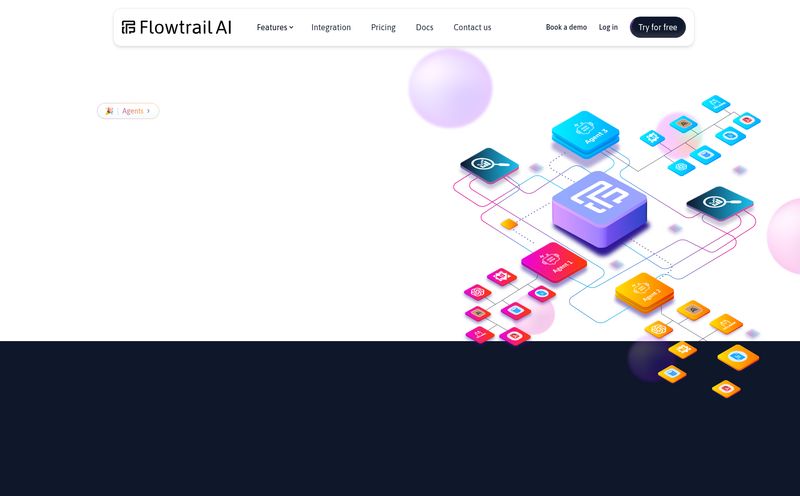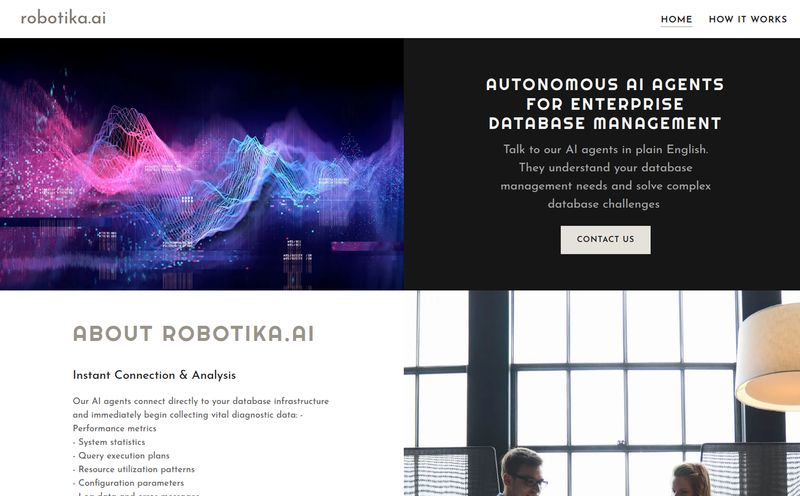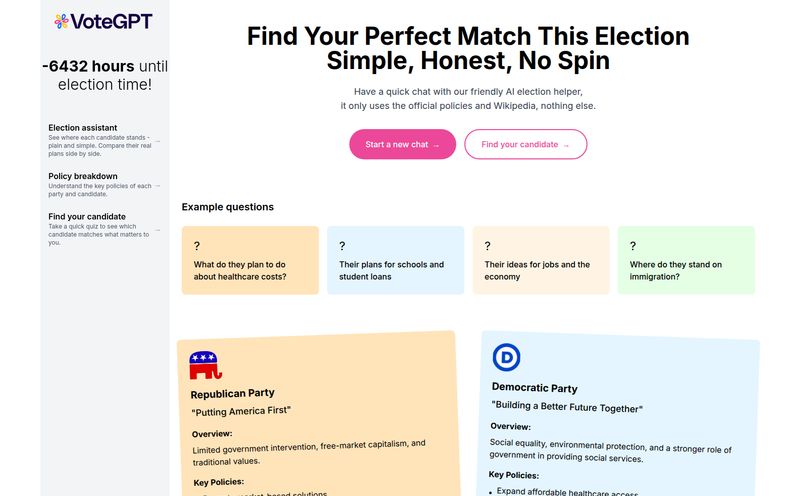In the SEO and digital marketing world, we're drowning in tools. Every single day, there's a new 'game-changer' that promises to automate everything, triple your traffic, and probably make you a perfect cup of coffee. Most of them are... well, just more noise. So when I heard about Cronbot, another AI chatbot platform, my first reaction was a healthy dose of skepticism. An AI chatbot and a CRM? All in one? It sounds ambitious.
But then I saw that over 400 SaaS companies are apparently using it, and my curiosity got the better of me. When that many tech-savvy businesses jump on a bandwagon, you have to at least peek under the hood. So I did. And what I found was genuinely interesting, with a few caveats of course. Nothing's ever perfect, right?
So, What is Cronbot Anyway?
Forget the typical, clunky chatbots of yesterday—the ones that could only answer three pre-programmed questions and then threw their digital hands up in despair. Cronbot is different. It's an AI-powered platform that acts as both a customer support agent and a data analyst, all rolled into one chat window on your website. The big idea is to take all your scattered company data—your help docs, your product specs, your internal wikis—and turn it into a smart, conversational assistant.
Essentially, it lets your website visitors have a real conversation to find what they need, instead of clicking through endless menus or waiting for a support ticket response. It's a no-code platform, which is music to the ears of people like me who'd rather focus on content and strategy than wrangling with APIs. It’s like giving your website its own brain and a friendly voice.

Visit Cronbot
The Standout Features That Actually Matter
A long list of features can be overwhelming. Let's cut through the marketing fluff and talk about what actually caught my eye as a professional who deals with traffic and user experience daily.
Turning Your Messy Data into Clean Conversations
This, for me, is the crown jewel. We all have a digital 'junk drawer' of information. Product guides in PDF format, sales numbers in Excel sheets, team knowledge locked away in a Notion workspace, endless website pages... Cronbot claims it can ingest all of it. You can connect it to PDFs, CSVs, URLs, or even an entire sitemap. It then uses this information to answer customer questions accurately. Think of it as transforming your dusty, forgotten knowledge base into an on-demand, friendly librarian who knows exactly where everything is. It’s a powerful concept for improving user engagement on-site.
More Than a Chatbot, It's a Hub
The integrated CRM and the connections to other platforms are where Cronbot starts to show its ambition. It’s not just about answering questions; it's about managing the customer relationship. It has integrations with the big players like Slack, Intercom, Hubspot, Discord, and Microsoft Teams. This means the conversations your chatbot has can be piped directly to the tools your team already uses. Now, full disclosure, the site does mention some of these are 'Coming Soon', which is a bit of a tease. But the vision is there: to create a central hub for customer interactions, not just another isolated widget.
Putting Cronbot to the Test: The Good and The Not-So-Good
Alright, no tool is without its quirks. After digging through the specs and thinking about practical application, here’s my honest take. I've always felt that a balanced view is more useful than blind praise.
On the plus side, the potential for automated customer support is massive. Imagine cutting down on repetitive support tickets and freeing up your human team for more complex issues. That’s a direct impact on your bottom line. The improved customer engagement is another big win. A user who gets an instant, helpful answer is far more likely to convert than one who gets frustrated and leaves. And the ability to explore your own data just by asking questions? That's incredibly efficient. No more digging through spreadsheets to find a specific stat.
However, let's be realistic. There are a few things to consider. On the lower plans, you're limited to GPT-3.5 Turbo. To get the more powerful GPT-4 model, you have to pay extra per use on the Pro and Premium plans. This could make costs unpredictable if you have high traffic. The document limits on the Standard plan (2000 documents) might also feel a bit tight for a company with an extensive knowledge base. It's a classic SaaS strategy—get you in the door, then upsell you on the features you really need.
Let's Talk Money: Breaking Down Cronbot's Pricing
Pricing is always the million-dollar question, isn't it? Or in this case, the $29-a-month question. Cronbot has a tiered structure that seems designed to scale with your business. Here’s a quick-and-dirty breakdown:
| Plan | Price | Key Features |
|---|---|---|
| Standard | $29 /month | GPT-3.5 Turbo, 500 messages/month, 2,000 documents, 20 users. Good for small teams or those just starting out. |
| Pro | Contact for Pricing | GPT-4 access (extra cost), 1,500 messages/month, 5,000 documents, adds 2FA and enhanced support. For growing businesses. |
| Premium | Contact for Pricing | 3,000 messages/month, 10,000 documents, adds SSO and ISO compliance, personalized onboarding. For established companies. |
| Enterprise | Contact for Pricing | Customizable limits (starting at 20k messages), GPT-4 included, dedicated account manager. The whole shebang. |
My take? The Standard plan is a very accessible entry point. But you need to be mindful of those limits. The 'Contact for Pricing' on the upper tiers is pretty standard for B2B SaaS, but it always makes me wish they’d just be transparent. Overall, the structure makes sense, but you'll want to estimate your usage carefully before committing.
So, Who Is Cronbot Really For?
After looking at everything, Cronbot feels tailor-made for SaaS companies. The feature set, the integrations, the focus on turning technical documents into support conversations—it all screams SaaS. However, I could easily see it being incredibly useful for e-commerce sites with large product catalogs, educational institutions with extensive course materials, or even content-heavy publishers like myself. Any business that has a wealth of information and a stream of user questions could benefit. If your support team is constantly answering the same questions, or if your bounce rate is high because users can't find information, this is a tool you should probably look at.
Frequently Asked Questions about Cronbot
Is Cronbot difficult to set up?
No, it's designed as a no-code platform. The setup mainly involves connecting your data sources (like uploading files or adding URLs) and then embedding a small snippet of code on your website. No advanced programming should be needed for the basic setup.
Can Cronbot handle very specific or complex questions?
Its ability depends on the quality and comprehensiveness of the data you provide it. If the answer exists in your documents, the AI is designed to find it. For questions outside its knowledge base or those requiring human empathy, you'd still want a system to escalate to a live agent.
What's the real difference between GPT-3.5 and GPT-4 for a chatbot?
Think of GPT-4 as a significant upgrade. It has a much better grasp of nuance, context, and complex reasoning. For a customer-facing chatbot, this means more accurate, human-like, and helpful responses, especially for tricky or multi-part questions.
How does Cronbot handle data security?
The platform mentions standard encryption and SSL protection on all plans. Higher-tier plans offer advanced compliance like GDPR, SOC 2, and ISO 27001, along with features like 2-Factor Authentication (2FA) and Single Sign-On (SSO), which are critical for larger organizations.
Can I customize the look of the chatbot?
While not explicitly detailed in the provided info, most modern chatbot platforms offer customization options to match the bot's appearance (colors, logos, etc.) to your website's branding for a consistent user experience. I would assume Cronbot offers this.
My Final Verdict: Is Cronbot Worth the Hype?
So, we come back to the original question. Is Cronbot just more noise, or is it a genuinely useful tool? In my opinion, it leans heavily toward the latter. It's an intelligent and well-thought-out solution to a very common problem: connecting users with the information they need, instantly.
It’s not a magic wand, and you'll need to think about the pricing tiers and which AI model suits your needs. But the idea of consolidating customer support and data interaction into a single, smart, conversational interface is powerful. It’s one of the few tools I’ve seen recently that made me nod and say, “Yeah, that makes a lot of sense.” If you're struggling to manage customer inquiries or want to make your website a stickier, more helpful resource, Cronbot is definately worth a serious look.



